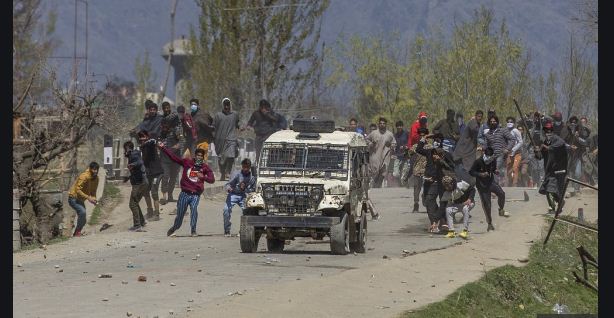AI report slams India for its clampdown on civil liberties in IIOJK

LONDON, APR 07 (DNA) – The London-based rights watchdog, Amnesty International has slammed India for its clampdown on civil liberties in Indian illegally occupied Jammu and Kashmir as well as punitive lockdown in response to the COVID-19 outbreak, use of force against the anti-CAA (Citizenship (Amendment) Act) protests, farmers’ protests and handling of Delhi riots.
According to Kashmir Media Service, the Amnesty International’s report “The State of the World’s Human Rights 2020/2021”, examines the human rights situation in 149 countries.
The report said that a year after the Modi government revoked the special status of IIOJK and split it into two union territories, the clampdown on civil liberties and restrictions on communications services continued.
It maintained that the Indian government continued to silence those who demanded accountability and imposed a harsh media blackout in the territory. The report pointed out that at least 18 journalists in IIOJK were physically attacked by Indian police or summoned to police stations.
It said that dissent was further suppressed when a new media policy was introduced by the government to create “a sustained narrative on the functioning of the government in media” by checking “anti-national activities”.
The report said that on 20 October, the occupation authorities closed the office of the Kashmir Times, without prior notice, after its editor, Anuradha Bhasin, had challenged the communications blockade in the Indian Supreme Court.
It said that the NIA (National Investigation Agency) also raided the offices and residences of civil society activists including Khurram Parvez and three of his associates, and Parveena Ahanger, who had reported extensively on human rights abuses in Kashmir alleging that the activists had raised funds for carrying out secessionist activities in IIOJK.
The report pointed out that on 30 September, Amnesty International India was forced to halt its operations after the government froze its bank accounts without notice. The organization was forced to lay off all its staff and pause all its campaign and research work.
This occurred shortly after Amnesty International India had published briefings demanding accountability for grave human rights violations carried out by the Delhi police and the government during the Delhi riots and in Jammu and Kashmir, it said.
The Amnesty International said that in July in Kashmir, three young labourers in an apple orchard were unlawfully killed by the Indian Army personnel enjoying impunity under draconian law, Armed Forces Special Powers Act, for their brutal actions.
The report said that there was widespread impunity and lack of accountability for murders and attacks carried out by vigilante mobs and police officers against religious minorities. Swift and extreme restrictions were placed on freedom of movement in response to the COVID-19, leaving thousands of migrant workers stranded without adequate food and protection. Some restrictions to curb the pandemic also threatened the right to privacy, it added.
On the freedoms of expression and assembly in India, the Amnesty said that new restrictions were imposed on freedoms of expression and assembly in response to the COVID-19 pandemic. It said that freedom of expression was guaranteed selectively, and dissent was repressed through unlawful restrictions on peaceful protests and by silencing critics.
It said that human rights defenders, including students, academics, journalists and artists, were arbitrarily arrested, often without charge or trial. “Despite a Supreme Court ruling to reduce prison overcrowding to curb the spread of COVID-19, the authorities continued to incarcerate many who were critical of the government,” it added.
The report maintained that during the nationwide lockdown imposed after the COVID-19 outbreak, more than 50 journalists were arrested or charged under emergency laws for spreading “misinformation” or “fake news”.
The government’s strategy to curb COVID-19 included a punitive lockdown at very short notice, lack of transparency in disbursing relief funds, threats to privacy, and demonization of religious minorities,” it added.
The Amnesty International said that on 28 September the Indian government amended the Foreign Contribution (Regulation) Act (FCRA), banning large NGOs from passing to grassroots NGOs funds received from foreign donors.
It said that in December 2019, the Indian government passed the Citizenship (Amendment) Act (CAA) enabling irregular migrants from Afghanistan, Bangladesh and Pakistan to obtain Indian citizenship, excluding Muslims. “The discriminatory nature of the CAA sparked peaceful protests across the country, which were met with arbitrary arrests and detention and widespread demonization of those protesting.
The Amnesty International said that more than 160 farmers died after three laws on farming were passed by Indian Parliament in August with minimal consultation. The causes of death included suicides, as well as heart attacks and road accidents during protests. In November, as the farmers marched towards Delhi to protest the laws, the Delhi police indiscriminately used water cannons and fired tear gas shells, injuring protesters.
On arbitrary arrests and detentions, the Amnesty International said that seven human rights activists – Father Stan Swamy, Jyoti Raghoba Jagtap, Sagar Tatyaram Gorkhe, Ramesh Murlidhar Gaichor, Hany Babu, Gautam Navlakha and Anand Teltumbde – were arrested by the National Investigation Agency (NIA) for their alleged involvement in violence during the Bhima Koregaon celebrations near the city of Pune in 2018.
Those arrested worked with marginalized groups, including Adivasi (Indigenous) communities, and had criticized government policies. The government accused them of breaching the Penal Code by “waging war against the country”.
The report said that many arrested activists were elderly and in poor health. However, they were held in overcrowded prisons where several inmates had either tested positive or died from COVID-19. Nevertheless, the courts continued to reject the bail pleas of the activists.
At least nine students peacefully protesting against the CAA were arrested and jailed under counter-terrorism and sedition laws. Many other anti-CAA protesters were subjected to intense intimidation and harassment by the police.
Meanwhile, the report said, the authorities ignored violence and hate speech by the supporters of the CAA against those protesting draconian counter-terrorism laws, including the Unlawful Activities (Prevention) Act and National Security Act. Safoora Zargar, a research scholar who was three months’ pregnant at the time, and Umar Khalid, a former student union leader, were among those arrested.
The report pointed out that on 26 June, the UN High Commissioner for Human Rights called on India to immediately release human rights defenders who had been arrested for protesting against the CAA. However, the majority remained in detention at the end of the year, it added.
In December, the Amnesty International said, Uttar Pradesh police arbitrarily arrested 10 Muslim men under a law introduced by the Uttar Pradesh Government that targets consensual interfaith marriages, and allegedly tortured them. The legislation, which has been termed the “love jihad” law by right-wing nationalists and leading politicians, had not been approved by the Indian Parliament or the state legislature.
Mentioning the unfair trials, the report maintained that the courts, particularly the Supreme Court, failed to monitor the government’s response to the COVID-19 crisis in a timely manner.
“On 13 March, even before the national lockdown was imposed, the Supreme Court declared that the courts – for public health reasons – would function at reduced capacity. Between 23 March and 4 July, the Supreme Court only took up cases of “extreme urgency”, barring physical hearings and relying on video conferencing facilities,” it said.
The Amnesty International deplored that no qualifying criteria or definitions were laid down for cases of “extreme urgency”, leaving judges with wide discretion, resulting in many significant cases involving grave human rights violations either not being heard or being seriously delayed.
The report said that the Supreme Court routinely undermined its own impartiality and independence. “In August it convicted Prashant Bhushan, a lawyer and human rights defender, under the outdated provisions of criminal contempt laws. Prashant Bhushan had criticized on Twitter the court’s functioning since 2014,” it added.
On unlawful attacks and killings, the Amnesty International said that in February, communal violence broke out in the capital, New Delhi. According to government data, 53 people – mostly Muslims – died in the riots, and more than 500 were injured. It said that in the build-up to the Legislative Assembly elections in Delhi, held on 8 February, several political leaders made hate speeches against the anti-CAA protesters.
On 27 January, referring to the protesters at Shaheen Bagh, the Delhi epicentre of peaceful sits-ins against the CAA, the Union Minister of State for Finance, Anurag Thakur, encouraged the crowd to chant “shoot the traitors of the nation”. On 28 January, Parvesh Verma, member of parliament for the ruling Bharatiya Janata Party (BJP), promised to “not leave even one of [the mosques] standing” after the BJP’s election win in Delhi.
These speeches were followed by violence on university campuses against those protesting against the CAA, it said.
Referring to the excessive use of force, the Amnesty International said that the police used unlawful force and committed various other human rights violations, abusing laws to intimidate people and silence dissent on be
It said that during the February communal violence in Delhi, members of the Delhi police pelted stones alongside rioters, tortured people in custody, dismantled sites of peaceful protests and stood by as rioters attacked peaceful protesters and destroyed public and private property. No independent investigation was launched into these acts.
The report maintained that as the COVID-19 pandemic unfolded, the discriminatory enforcement of the lockdown restrictions by the police heightened human rights concerns. The majority of those arrested for violating the lockdown guidelines belonged to marginalized communities such as Scheduled Castes, Scheduled Tribes, Denotified Tribes, Muslims or low-income workers.
In March, migrant workers who were travelling back home were forced by the Uttar Pradesh police to crawl on the road carrying their belongings, as punishment for breaching the lockdown guidelines. Mentioning the impunity, the Amnesty International said that the police continued to carry out unlawful killings – some amounting to extrajudicial executions with impunity.
It said that in July in Kashmir, three young labourers in an apple orchard were unlawfully killed by members of the Indian army. The Armed Forces (Special Powers) Act, which governs the use of force by the forces’ personnel in Kashmir, grants virtual immunity to members of the security forces from prosecution for human rights violations, it added.
It said that in another extrajudicial execution in July, Vikas Dubey was allegedly killed while being escorted to the city of Kanpur after his arrest by Uttar Pradesh police. Four of his associates were also killed unlawfully by the Uttar Pradesh police.
It said that hate crimes including violence against Dalits, Adivasi (Indigenous) communities and religious minorities were also committed with impunity. In September, a Dalit woman was allegedly raped and murdered by a group of dominant-caste men in Hathras district in Uttar Pradesh, and cremated by the Uttar Pradesh police without her family’s consent. The accused men were arrested only after nationwide protests. Later, several FIRs were registered by the Uttar Pradesh police against the protesters for criminal conspiracy and sedition
On the right to health and livelihood, the Amnesty International said that the handling of the COVID-19 pandemic exposed weaknesses in the public health care system. It also resulted in unsafe and poor working conditions for those who lack adequate social and economic protection, such as community health care workers and religious minorities.
It said that the government accused members of the Muslim Tablighi Jamaat minority of spreading COVID-19, and as a result, health care facilities denied access to Muslims. Instances of hospitals refusing Muslim pregnant women and cancer patients surfaced in April 2020. In the months following the nationwide lockdown of March, social media and WhatsApp groups were flooded with calls for social and economic boycotts of Muslims, alongside fake news stories and other misinformation.
The report pointed out that the Supreme Court delayed a hearing in a public interest case urgently seeking transport, food and shelter for migrant workers who were left stranded for over a month by the sudden imposition of the lockdown. It said that at least 200 migrant workers were killed in road accidents while walking long distances home in other districts or states during the lockdown.
The report said that during the lockdown, workers in the informal sector – who constitute more than three-quarters of India’s workforce – faced enormous difficulties due to rampant job losses. However, many states suspended the legal protections otherwise afforded to workers, such as regulation of working hours, the right to form trade unions, and safe working conditions. = DNA
======================
Related News

France extends heartfelt condolences to Pakistan after Balochistan attacks
ISLAMABAD, FEB 1 /DNA/ – The French Embassy in Pakistan issued a strong condemnation ofRead More

CDA rolls out regulated community market to back local businesses
ISLAMABAD, 01 FEB (DNA) — The Capital Development Authority (CDA) has rolled out a fully regulatedRead More


Comments are Closed